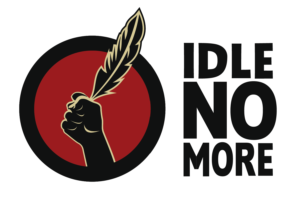National inquiry should be led by indigenous women, says Idle No More organizer – Idle No More
By Madeline Kotzer, CBC News
A Saskatoon-based organizer for the Idle No More movement has entered into the debate over whether or not a national inquiry is needed into the issue of missing and murdered aboriginal women.
Alex Wilson, an Idle No More organizer as well as an Associate Professor in the Department of Educational Foundations and the Academic Director of the Aboriginal Education Research Centre at the University of Saskatchewan, told CBC News on Wednesday that not only is an inquiry needed, but that it must be lead by indigenous women.
‘This isn’t just some kind of fringe group wanting attention. This is an issue of national importance,’– Alex Wilson, Idle No More organizer
“I think indigenous women should direct and lead and every step of the way be a part of any kind of academic research community or otherwise inquiry investigation, or commission, that examines this issue,” Wilson said.
Wilson explained that there are various models a national inquiry could adopt, from a community-coordinated response approach to round table discussions to a formal research-based study like the Aboriginal Justice Inquiry, commissioned in the late 80s.
Wilson explained that any sort of investigation into the murders and disappearances of aboriginal women must be focused around the inclusion of input and direction from the victims’ families. She also stated that such an inquiry must be implemented federally in order to give the cause the importance and legitimacy it deserves.
“This isn’t just some kind of fringe group wanting attention. This is an issue of national importance. We have a segment of our population, as a country, that are being continually violated and experiencing violence at rates way higher than the rest of the population,” Wilson said.
Saskatoon expert weighs in
Tom Molloy’s work on treaty and land claim negotiations has had him occupy various roles throughout his long career, most significantly that of the Chief Federal Negotiator on First Nations’ treaties for the Canadian government.
The Saskatoon-based expert delivered a talk on Wednesday at the city’s Canadian Club. Molloy said he had initially planned to speak about the history of treaties in Canada, however he decided the topic of missing and murdered Aboriginal women was more pressing.
“I am in favour of a commission into the issue, I know that there have been studies that have been done but those studies could help form the foundation,” Molloy explained. “People say there have been studies done but those studies have been done for a specific purpose.”
Politicians divided, police disagree
In late August, while in Whitehorse as a part of an annual tour of the North, Prime Minister Stephen Harper dismissed renewed calls for a national inquiry into missing and murdered aboriginal women after the killing of 15-year-old Tina Fontaine in Winnipeg was raised.
However, following the Prime Minister’s remarks, Aboriginal Affairs Minister Bernard Valcourt told CBC News Network’s Power and Politics’ host, Evan Solomon, that if the premiers ask the federal government to be part of a roundtable discussion, it would participate.
‘A commission doesn’t have to re-invent the wheel,’– Tom Molloy
Saskatchewan Premier Brad Wall said he doesn’t know how long any level of government can ignore something like the slaying of a 15-year-old aboriginal girl before looking at ways to prevent such deaths.
“I think when the provinces are united as we are, together with the national aboriginal leadership, I think there is momentum,” Wall said in a telephone interview with The Canadian Press.
Molloy said an inquiry into the issue could examine poverty on reserves, poor housing and education in order to identify root causes that link these societal disadvantages to the murder of women.
“A commission doesn’t have to re-invent the wheel. They can look at all of those studies and see what is relevant, what needs to be updated and what new research needs to be taken. There could be a time limit set on the commission, but someone has to take responsibility for looking at this in a holistic way.”
Molloy also noted that it would be helpful for Aboriginal leaders, sociologists and police to work together in such a commission.
However, Saskatoon Police Chief and head of The Canadian Association of Chiefs of Police, Clive Weighill, said police do not plan on endorsing a public inquiry into missing and murdered aboriginal women. Weighill explained such an exercise would only delay action.
